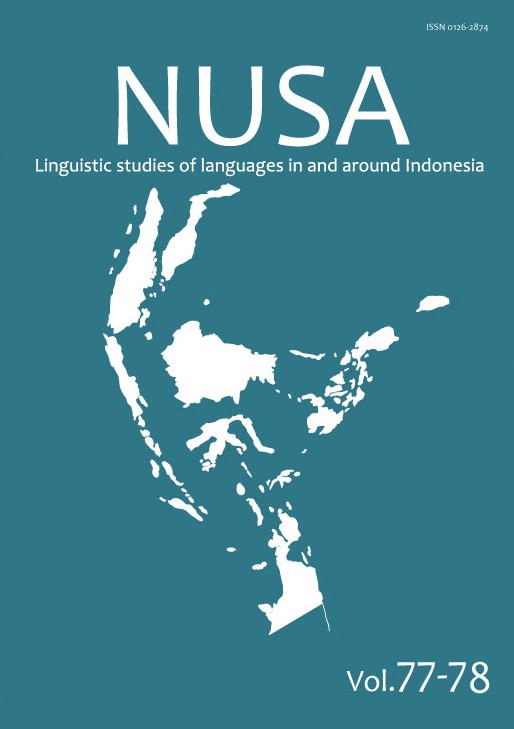PublicationsNUSA: Linguistic studies of languages in and around Indonesia



LIST OF PAPERS
First notes on Muno (Papua New Guinea)
Rönchen, Philipp
p1-p37
An un-Austronesian Austronesian language: Proto-Western Yapen and its lexicon
GASSER, Emily & BENESCH, Montreal
p39-p60
Past editions of NUSA can view at the “Prometheus-Academic Collections of Tokyo University of Foreign Studies” .
NUSA focuses primarily on works about languages in Indonesia, but studies of languages from nearby countries are also welcome. Papers appearing in NUSA may be original or translated from languages other than English. NUSA is a peer-reviewed journal and all papers will be fully refereed by at least two anonymous reviewers.
NUSA is the product of a joint cooperation agreement between the PKBB (Pusat Kajian Bahasa dan Budaya ‘Centre for Culture and Language Studies’) of Atma Jaya Catholic University of Indonesia in Jakarta, Indonesia, and ILCAA (Institute for Languages and Cultures of Asia and Africa) at the Tokyo University of Foreign Studies in Tokyo, Japan.
NUSA was founded by John Verhaar in 1975 and was first published by Badan Penyelenggara Seri NUSA. From 1982, NUSA was co-published with Atma Jaya Catholic University of Indonesia in Jakarta. In 2009, NUSA joined the Southeast Asian Linguistics Archives and digitised versions of past editions were made available online via http://sealang.net/sala. Since 2013, NUSA is made available both as an open-access electronic journal published in Tokyo, and in a print edition published in Jakarta.
Although our main interest is the area of Indonesia, we welcome works on general linguistics that can throw light upon problems that we might face. It is hoped that NUSA might be relevant beyond the range of typological and area specializations and at the same time also serve the deoccidentalization of linguistics.
For members of the editorial committee and review board please see here (link).
The journal is published twice a year, on March 31 and September 30. Submissions are accepted at any time. Editorial enquiries should be addressed to nusa@tufs.ac.jp
See below for further details for the submission.
The journal is published twice a year, on March 31 and September 30. Submissions are accepted at any time. NUSA does not charge authors article processing charges or any fee.
Templates are available in MS Word (214KB) and LaTeX (204KB). More detailed information can be found in these files.
Editorial enquiries should be addressed to nusa[at]tufs.ac.jp Please change [at] to @.
All NUSA articles are permanently archived in the Prometheus-academic collections of the Tokyo University of Foreign Studies Library. – Please do not link directly to PDF files when citing the articles. Please use the document URLs provided at the bottom of the first page of the articles (e.g. http://hdl.handle.net/10108/0000) as these are the persistent identifiers of these works.
Authors retain copyright over all works published in NUSA. All papers published by NUSA are made available through a Creative Commons Attribution Non-commercial No Derivatives license. A plain English description of the license can be viewed here http://creativecommons.org/licenses/by-nc-nd/3.0/. The full legal text appears here http://creativecommons.org/licenses/by-nc-nd/3.0/legalcode. Creative Commons licenses enable the legal sharing and reuse of cultural, educational, and scientific works and have been adopted by a growing number of scientists and scholars.

